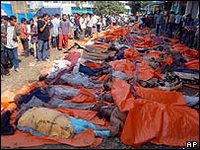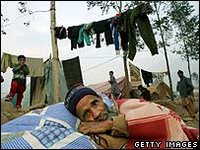Responding to a year of natural disaster - BBC
http://news.bbc.co.uk/2/hi/south_asia/4553286.stm
Last Updated: Wednesday, 28 December 2005, 00:43 GMT
E-mail this to a friend
Printable version
Responding to a year of natural disaster
By Paul Reynolds World Affairs correspondent, BBC News website
It has been a year of so many major natural disasters - the aftermath of the tsunami in Asia, the earthquake in Kashmir, the hurricane in New Orleans - that philosophers in the Middle Ages would have concluded that God was angry and man was being punished.

Natural disasters claimed many thousands of lives in 2005
In our day, with the exception of some fundamentalist preachers, we tend not to judge ourselves by the disasters themselves but by the way we respond to them.
And as far as the biggest disaster, the tsunami - in which about a quarter of a million people died - was concerned, the world responded better than some people, myself included, had feared.
There are still some serious problems, especially those of reconstruction, but the immediate relief effort was huge and the money raised both by governments and individuals was significant.
"The tsunami started in the most dramatic way possible, with nature at its worst and humanity at its best," said the UN emergency relief coordinator Jan Egeland.
"It was a year where we by and large rose to the challenge like never before. The speed with which people got food, water, medical relief and emergency shelters was very impressive."
He summed up: "I think the world was great in the tsunami."
Money talks
Now you can argue with that and say that humanity is not at its best when it fails to put warning systems into place - and at one stage monitors in the Pacific and a meteorologist in Thailand knew what was happening but did not know who to call.
And inevitably there were failures to get help where it was needed quickly, but Mr Egeland's judgement will probably not be seriously challenged a year on.
The money alone tells its own story. According to figures complied by Reuters, about $7bn (£4bn) was raised by governments and more than $5 billion by private donations.
A particular phenomenon was the way in which money from ordinary people was sometimes larger than the amounts given by their government
The United States ($2.337bn) led the donors, followed by Germany ($1.307bn), Britain ($1.108bn), Australia ($1.023bn), with collective contributions from the Asia Development Bank, the EU and the World Bank and substantial sums from Japan, Canada, the Netherlands, France and others.
A particular phenomenon was the way in which money from ordinary people was sometimes larger than the amounts given by their governments.
The US government gave $857m (the largest of any government donation) and $1.48bn came from individuals. The same was true for Germany ($643m from government and $663m from citizens) and Britain ($445m and $663m), France ($182m and $405m) and Sweden, which lost many people in Thailand ($90m and $137m).
In some other countries, especially the Netherlands and Canada, citizen donors ran their government contributions close.
Road to recovery
The tsunami moved money as well as emotions. The large amounts show how powerful an issue aid and development has become in Western societies.
But, and it is a big but, if the world has got better at sending immediate help, there is still a lot to do when it comes to reconstruction.
Oxfam International issued a report recently stating that "providing shelter for those displaced is proving the toughest challenge one year on."
However, in a more encouraging second report, it said: "More than half the people are back to work and economies are fast returning to normal."
Rebuilding is an old problem in the provision of aid. "Recovery is far more difficult than relief," said Eric Schwartz, the UN's deputy special envoy for tsunami recovery.
A UN team reported: "We are concerned that a year later, reconstruction efforts are plagued by serious delays and have not been awarded the priority they so urgently warrant."
Many victims, probably a majority of the estimated 1.8 million who were left homeless, are still living in temporary shelters, especially in Sri Lanka and Indonesia, the worst-hit countries.
Kashmir quake
This is even truer of the second worst disaster, the earthquake in Kashmir in October, which affected mainly the Pakistani side of the Line of Control and killed about 87,000 people.
Here the relief effort was not quite so quick, perhaps partly because of the mountains. The United States again provided the most aid and brought in helicopters, which are still there. Britain sent some as well, but the old political rivalry with India prevented the arrival of substantial help from Pakistan's neighbour.
A cold winter awaits the survivors of the Kashmir earthquake
And again there has been a great deal of individual giving, for example from the hundreds of thousands of Kashmiris who live in Britain. But it is touch and go whether enough has been done to stop people from freezing in the forthcoming winter. Jan Egeland is not so optimistic about this relief effort. He said that hundreds of thousands of lives were at stake.
There has been one organisational improvement. The UN has just set up a $500m fund for immediate disaster relief, something Mr Egeland has long been arguing for. A word about New Orleans: here the portrait of quick relief and delayed reconstruction was reversed. The problem in New Orleans was the slow response - at all levels of government - but here is no issue about reconstruction. The money available is immense. The US Congress has appropriated $62bn and the eventual sum, some conservative budget-waters fear, could run to $200bn. And there is no doubt of the ambition. The levees will be rebuilt and strengthened and the city will be repopulated.
Paul.Reynolds-INTERNET@bbc.co.uk E-mail this to a friend Printable version
LINKS TO MORE SOUTH ASIA STORIES


2 Comments:
Just wanted to wish you and yours a belated Merry Christmas and happy new year. Look forward to introducing my new bride in a couple of weeks:)
Thanks Sean. Happy new year to you. See you in a couple of weeks.
Post a Comment
<< Home